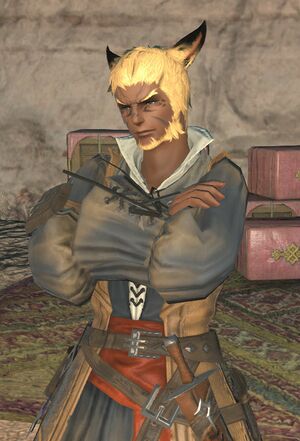M Tribe

“"The fires of war spread across Gyr Abania, and soon we ourselves may be forced to enter the fray. Should it come to pass, then it will fall to me to guide my people through the flames, for I have the rare and unfortunate honor to serve not only as nunh, but as leader of my people."
— M'rahz Nunh
The M Tribe is one of the small Seeker of the Sun Miqo'te tribes that makes The Fringes their home. The tribe was once so large that they had two Nunhs, until the Garlean Empire laid siege to the land and claimed it for their own. They derive their name from the Marmot beastkin totem.
History
The M Tribe was once so large it spanned most of The Fringes. Originally it was led by a single nunh, however when M'rahz Nunh took charge of the tribe, he named his friend M'aht a nunh as well, and they led the tribe together. They once shared the land, albeit begrudgingly, with the Qalyana, but had some conflict with them from time to time. The tribes would become enemies however, following the betrayal by the Qalyana, who poisoned the fruit of the lands with Black Rose, driving the wildlife into a mad frenzy. The beasts charged the Miqo'te village, and M'aht drove the animals into the gorge, where he collapsed a tunnel to trap the animals, and used his now petrified body to seal the entrance to the cave, ensuring that they would not escape and harm his people again.
Some time after this, the M Tribe suffered yet another loss when the Garlean Empire came and conquered the lands. The Miqo'te were pushed further and further back, until at last they made their home atop the Peering Stones, where they were safe from most threats. Once the Empire was driven out, the tribe began slowly retaking their land once again.
Other than the nunh, the tribe is almost entirely female, as most of the males either died fighting the Empire, the Qalyana, or have left to start tribes of their own. The few that remain are the Tia who seek to defeat the nunh and take over as the leader of the tribe. The M Tribe generally live off the game of The Fringes, however they do welcome travelers and trade. Though they are open to any who wish to enter the Peering Stones, any who acts with aggression is swiftly dealt with. High atop the Peering Stones, the M Tribe has carved out a sacred burial ground, where they lay their people to rest, keeping them close to home, but safe from graverobbers.
Notable members
Lore
Calling the Fringes its home since eras past, the M tribe played a vital role in the struggle for Ala Mhigo's liberation. That the tribe has survived to this day is in no small part due to the efforts and sacrifices of its members, be they great or small.
History
During the Age of Endless Frost, a great migratory wave saw tribes of Miqo'te cross the frozen seas to Eorzea. Following the Velodyna River northward, they finally arrived in the region now known as Gyr Abania.
As the ice melted, giving way to the Fifth Astral Era, the majority of these tribes spread across the realm, but the J and M peoples alone elected to remain, the former settling in the Peaks while the latter claimed the Fringes for its hunting grounds.
Since that time, the M tribe has lived quietly in its domain east of the Velodyna, untouched by the changes that unfolded around them. They watched from afar as the city-state of Skalla rose and fell in the neighboring Lochs, and survived the floods of the Sixth Umbral Calamity and all that followed. Though they occasionally entered into alliances with other races, ever did they preserve their distinct identity and their crag-top home.
However, the tribe's resilience would be sorely tested under imperial rule. Rendered unwelcome in their own territory, it was all they could do to eke out a living. To limit the mouths that wanted for feeding, they took the drastic action of shedding their second nunh, but this was no permanent solution to their hardships. Thus did they join hands with the Ala Mhigan Resistance, that they might reclaim the freedom to simply live their lives. [1]
References
- ↑ Encyclopaedia Eorzea: Volume II, page 113